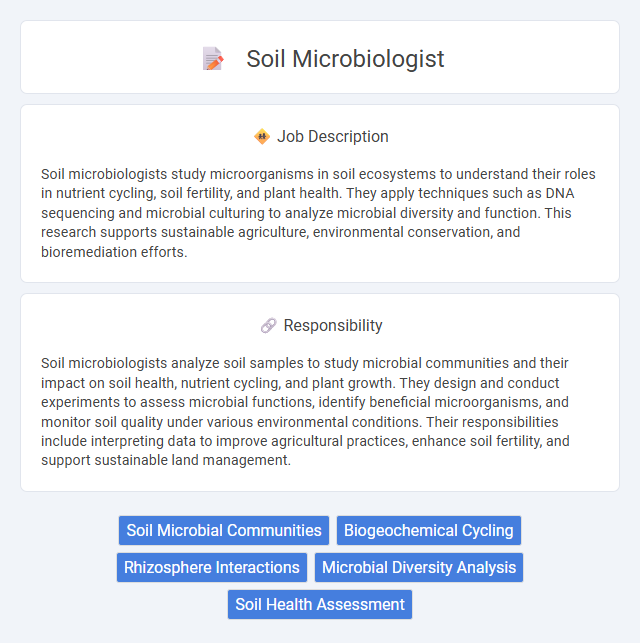
Soil microbiologists study microorganisms in soil ecosystems to understand their roles in nutrient cycling, soil fertility, and plant health. They apply techniques such as DNA sequencing and microbial culturing to analyze microbial diversity and function. This research supports sustainable agriculture, environmental conservation, and bioremediation efforts.
Individuals with a strong curiosity for environmental science and a preference for working outdoors or in laboratory settings may be well-suited for a Soil Microbiologist role. Those who enjoy meticulous research, are comfortable handling soil samples, and possess analytical skills likely find satisfaction in this field. However, people who prefer routine tasks or minimal scientific inquiry might find the demands of this job challenging.
Qualification
A Soil Microbiologist typically requires a bachelor's degree in microbiology, soil science, or environmental science, with many positions favoring a master's or Ph.D. for advanced research roles. Proficiency in molecular biology techniques, microbial ecology, and soil chemistry is essential to analyze soil microbial communities and their interactions accurately. Strong skills in data analysis, laboratory management, and field sampling are critical for successful experimentation and interpretation of soil microbial functions.
Responsibility
Soil microbiologists analyze soil samples to study microbial communities and their impact on soil health, nutrient cycling, and plant growth. They design and conduct experiments to assess microbial functions, identify beneficial microorganisms, and monitor soil quality under various environmental conditions. Their responsibilities include interpreting data to improve agricultural practices, enhance soil fertility, and support sustainable land management.
Benefit
Soil microbiologists likely benefit from contributing to sustainable agriculture by improving soil health and crop productivity through the study of microorganisms. This specialization probably offers opportunities to work on environmental conservation projects, enhancing ecosystem resilience and land rehabilitation efforts. They may also experience professional growth in research and development sectors focused on biotechnology and soil management solutions.
Challenge
Soil microbiologists likely face the challenge of analyzing complex microbial communities in diverse soil environments to understand their roles in nutrient cycling and ecosystem health. They probably need to develop innovative techniques to accurately identify and quantify microorganisms amid soil's heterogeneous matrix. Managing unpredictable variables such as soil composition, moisture, and contamination likely complicates experimental consistency and data interpretation.
Career Advancement
Soil Microbiologists can advance their careers by specializing in areas such as environmental restoration, agricultural innovation, or bioremediation technologies. Gaining expertise through advanced degrees and certifications in microbiology and soil science enhances opportunities for leadership roles in research institutions, government agencies, and private sector companies. Networking with professionals in environmental consulting and sustainable farming increases access to project management positions and collaborative initiatives focused on soil health and ecosystem sustainability.
Key Terms
Soil Microbial Communities
Soil microbiologists study soil microbial communities to understand their roles in nutrient cycling, soil health, and ecosystem sustainability. They analyze microbial diversity, abundance, and interactions using advanced molecular techniques such as DNA sequencing and metagenomics. Their research informs sustainable agriculture practices, bioremediation strategies, and soil conservation efforts.
Biogeochemical Cycling
Soil microbiologists specializing in biogeochemical cycling study the interactions between soil microorganisms and nutrient transformations critical for ecosystem functioning. Their work involves analyzing microbial processes that regulate the carbon, nitrogen, phosphorus, and sulfur cycles, directly impacting soil health and agricultural productivity. Utilizing molecular techniques and field experiments, they identify microbial communities that drive nutrient availability and greenhouse gas emissions in various soil environments.
Rhizosphere Interactions
Soil microbiologists specializing in rhizosphere interactions study the complex relationships between soil microorganisms and plant roots that influence nutrient cycling, plant health, and soil structure. Their research uncovers key microbial functions such as nitrogen fixation, phosphorus solubilization, and pathogen suppression within the rhizosphere, enhancing sustainable agricultural practices. Expertise in molecular biology techniques, microbial ecology, and soil chemistry is essential to optimize crop productivity and environmental resilience.
Microbial Diversity Analysis
Soil microbiologists specializing in microbial diversity analysis utilize advanced molecular techniques such as DNA sequencing and metagenomics to identify and characterize microbial communities within soil ecosystems. They assess the impact of environmental factors on microbial population dynamics and their roles in nutrient cycling, soil fertility, and plant health. Expertise in bioinformatics tools and statistical models is essential for interpreting complex microbial diversity data to enhance sustainable agriculture and soil conservation practices.
Soil Health Assessment
Soil microbiologists specializing in soil health assessment analyze microbial communities to evaluate soil fertility, nutrient cycling, and ecosystem stability. They use molecular techniques such as DNA sequencing and biomarker analysis to identify beneficial microbes that enhance soil productivity and suppress pathogens. Their research supports sustainable agriculture by guiding soil management practices that improve soil structure and promote long-term soil resilience.
 kuljobs.com
kuljobs.com